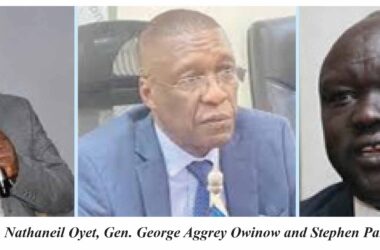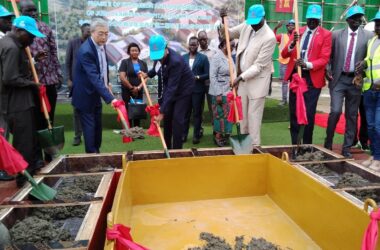By Kei Emmanuel Duku
Minister of Trade and Industry, Joseph Moum Majak, reassured the public that the government is actively monitoring the prices of basic commodities to combat inflation and protect consumers.
In recent months, the prices of goods have skyrocketed due to a rise in the foreign exchange market.
Minister Majak said on Tuesday in a media briefing that the government will establish a panel dedicated to regularly tracking the prices and availability of essential goods.
“We will implement a robust monitoring system to ensure that the prices of essential commodities remain fair and stable,” Majak stated. “Our goal is to prevent artificial price inflation and safeguard consumer interests.”
In addition to monitoring prices, Majak emphasized the government’s commitment to importing more essential food items to help stabilize the market.
“We are collaborating with the Ministry of Finance to expedite the issuance of letters of credit for food imports, ensuring that these vital goods reach our markets efficiently,” he added.
The minister also highlighted plans to work closely with the Ministry of Finance and Planning to allocate funds specifically for critical items such as food, fuel, and medicine.
Traders will be selected to receive these letters of credit, facilitating smoother import processes.
He said the government plans to partner with local producers and farmers to procure food items at lower prices, promoting domestic production while reducing reliance on imports.
In his part, Vice Chairperson of the South Sudan National Chamber of Commerce, Industry, and Agriculture, John Lual Akol, attributed exorbitant taxes by the Juba City Council Authorities and South Sudan National Revenue Authority for rising commodity prices in Juba and other parts of the country.
Akol called for a multi-sectorial approach to address hyperinflation.
He emphasized that the government must take action to alleviate the burden on ordinary citizens affected by the market crisis.
Akol further noted that many traders rely on the black market to access US dollars for importing essential commodities.
He urged the government to implement a clear mechanism to facilitate access to hard currency, criticizing the idea of banning street exchange of US dollars.
The chamber official suggested that the government should support local farmers to diversify the economy and reduce dependence on imported commodities.
He argued that promoting local agriculture would reduce the need for hard currency for imports.
However, Wani Tom Sebit, the Central Equatorial State Minister of Trade and Industry, refuted claims of excessive taxation by the Juba City Council.
He stated that the taxes collected by the council are per the standard rates approved by the state government.




